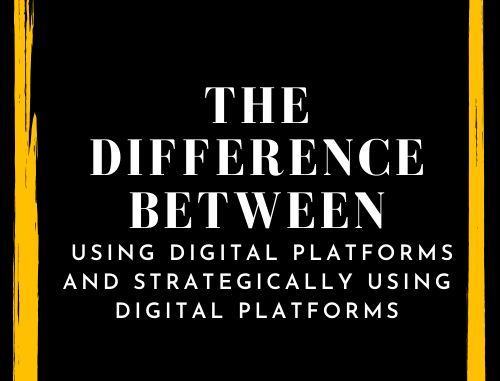
In the ever-evolving world of digital marketing, businesses often find themselves inundated with choices. With platforms like Facebook, Google Ads, Instagram, and LinkedIn, the potential to reach vast audiences is undeniable. However, simply being present on these platforms isn’t enough. The real key to success lies in the strategic use of these digital tools, tailored to the specific needs and behaviors of your target market.
Understanding the Landscape
It’s a common misconception that just knowing about and using various digital marketing platforms guarantees success. While platforms such as Facebook, Google Ads, and Instagram offer powerful tools for reaching audiences, their effectiveness hinges on understanding how to use them based on the unique characteristics of your market.
For instance, a business-to-business (B2B) company will find more value in LinkedIn ads compared to a business-to-consumer (B2C) company, which might see better results on Instagram or Facebook. Each platform has its own strengths, user base, and best practices. Recognizing these nuances is crucial for crafting a winning strategy.
Case Study: Event Marketing
Let’s consider event marketing as an example. When planning the promotion of an event, one of the primary considerations should be identifying where your potential attendees are likely to discover information about such events.
- Market Research: Before diving into any platform, it’s essential to conduct thorough market research. Understand your audience’s online behavior. Are they active on social media? Do they follow event pages? Are they part of specific online communities? Is the event you are marketing well known or new?
- Audience Behavior: In the context of an event, it’s critical to recognize that people rarely search for lesser-known events directly on Google. For example, if you’re hosting a local music festival, potential attendees are unlikely to search “music festival in [your city] this weekend.” Instead, they might stumble upon it through social media posts, event recommendation websites, or local influencer promotions.
- Platform Selection: Given this behavior, investing heavily in Google Ads for such an event might not yield the best results. Instead, a more effective strategy could involve targeted social media campaigns. Facebook and Instagram offer robust targeting options that allow you to reach users based on their interests, behaviors, and demographics.
- Content and Engagement: Engaging content is king. For event marketing, visually appealing posts, engaging stories, and interactive content like polls or contests can significantly enhance visibility and interest. Leveraging Facebook Events and Instagram Stories can create a buzz and encourage user participation.
Case Study: Paint Supply Company
Now, let’s explore a different scenario with a paint supply company. The target audience here typically has a direct plan and is more intentional with their search.
- User Intent: The average user looking for paint supplies often has a clear need and a direct plan. They are less likely to wait for a paint advertisement to show up on their social feed and more likely to perform a specific search query such as “paint supplier near me” on Google.
- Search Behavior: This behavior highlights a crucial difference. Users seeking paint supplies are usually in a buying mindset, looking for specific products, brands, or stores. This means they are more likely to engage with search ads that appear at the top of their search results.
- Platform Selection: For a paint supply company, investing in a Google marketing strategy that is heavily keyword and industry-focused will yield better results. Google Ads allows targeting users with high intent through specific search keywords, ensuring that your ad appears when potential customers are actively looking for paint supplies.
- SEO and Local Search: Enhancing your Google marketing strategy with strong SEO practices ensures that your business ranks well organically. Additionally, optimizing for local search can attract customers in your vicinity who are looking for immediate solutions.
Customizing Strategies for Different Markets
The approach to digital marketing should not be one-size-fits-all. Each industry, each market, and indeed each individual client has distinct characteristics that should shape your strategy. Here’s how you can tailor your approach:
- Identify Key Platforms: Depending on your industry, identify the platforms where your audience spends the most time. For a tech startup, LinkedIn and Twitter might be more effective, whereas a fashion brand could benefit from Instagram and Pinterest.
- Understand Search vs. Discovery: Determine whether your audience is more likely to discover your product/service through search engines or through content discovery on social media. This will influence your investment in search ads versus social media ads.
- Set Clear Objectives: Different platforms serve different purposes. Google Ads might be better for driving direct sales with high intent search queries, while Facebook and Instagram are excellent for brand awareness and engagement.
- Monitor and Adapt: Digital marketing is dynamic. Regularly monitor the performance of your campaigns across different platforms and be ready to adapt. Use analytics to understand what’s working and what’s not, and refine your strategies accordingly.
In conclusion, the distinction between simply using digital platforms and strategically using them is profound. A strategic approach requires a deep understanding of your target market, their online behavior, and the unique strengths of each platform. By tailoring your strategy to the specific needs of your market and continuously refining your approach, you can ensure that your digital marketing efforts are not only efficient but also highly effective. This tailored strategy will ultimately lead to more successful marketing campaigns, higher engagement rates, and better return on investment.
For a tailored marketing strategy for your business contact me.
